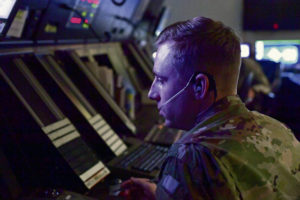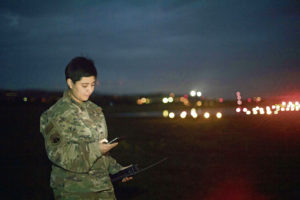
As the sun sets on Ramstein Air Base and many of its offices sit vacant, some work centers still have the lights on. The 86th Operations Support Squadron’s Knights remain ever-vigilant to keep the mission going every day and night.
During a typical day, life at the 86th OSS is abuzz with more than twenty different AFSCs held by more than 170 military, civilian, and contractor personnel within thirteen sections; one of Ramstein’s most diverse squadrons is busy ensuring operations don’t cease.
The Commander’s Support Staff ensures everything runs smoothly throughout the squadron while ensuring personnel readiness and accountability.
The Current Operations Flight works closely with the 603rd Air Operations Center’s Air Mobility Division to coordinate the 86th Airlift Wing’s flying schedule as well as logistics for all flights into and out of three separate areas of responsibility.
The Host Aviation Resource Management office double checks aircrew flight records to make sure they are current on all requirements prior to aircraft departure.
The Intelligence Flight delivers time sensitive briefings to aircrew on their assigned missions, highlighting potential threats the crews may face along the way, and re-checks the information for last minute updates before the crews step to their respective aircraft.
The Survival, Evasion, Resis-tance, and Escape specialists provide training to aircrew on life-saving techniques, should a worst-case scenario occur.
The Tactics and Joint Airdrop Inspections Flight conducts mission-essential training for aircrew and performs inspections of all cargo before it is airdropped in order to maximize safety and quality control.
Airfield Management patrols the flight line, checking all of the twelve separate navigational aids that enable safe take-offs and landings.
The Weather Flight uses different systems and tools located throughout the base and space, gathering up-to-date information that could impact operations.
The Aircrew Flight Equipment Flight meticulously inspects the crew’s equipment, everything from flight helmets to night vision goggles and weapons to survival gear, to ensure proper functionality.
Finally, the 86th OSS is home to the primary Air Traffic Control facility’s Tower controllers, Radar, Airfield & Weather Systems experts, and Ground-Controlled Approach professionals who not only maintain multiple systems across the base, but establish a smooth transition of flights entering and exiting Ramstein’s airspace.

Tonight is a special night. A night where a silent symphony can only be seen within the OSS to enable the success of the 86th Airlift Wing.
Tonight, as the Ramstein lights can be seen for miles, a no-notice mission drops. As important as these types of missions are, they are rare and typically conducted in response to an emergent situation. A phone rings in a cozy home located in Kaiserslautern, then another phone rings, then another. With limited time, indispensable members safely rush to their work centers to prepare for the mission that is still unknown.
The symphony begins with Current Operations coordinating the details of the previously unscheduled flight that will be taking off shortly. The aircrew arrive to the Intelligence office, where they are briefed on the current situation and other mission-critical information. From there, the crew proceeds to AFE to get issued their equipment required for the mission and check their night-vision goggles.
Seamlessly, the aircrew arrive to their aircraft and, after conducting their pre-flight checks, begin speaking with the ATC to acquire clearance for taxi and takeoff. During this time, the Weather Flight passes real-time data to the aircrew. Behind the scenes, Airfield Management conducts last minute checks for safe taxi and take-off for the mission.
The roar of the aircraft’s engines is heard as they take off. Air Traffic Controllers ensure a smooth hand-off is made to German controllers as the aircraft departs Ramstein’s airspace into the night. Just as quickly as the mission is launched, the thrash of the night subsides peacefully. Hours later, the sun begins to shine upon Ramstein. Work centers begin to return to life. Many are perhaps completely unaware of the hustle and bustle from the previous hours.
However, due to the importance of the 86th AW’s mission, movement of personnel, humanitarian aid, and aeromedical evacuation went unimpeded. The 86th OSS remained diligent through it all, ensuring that “Ops Never Stops.”


